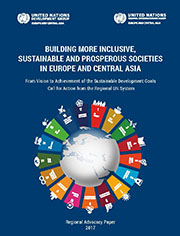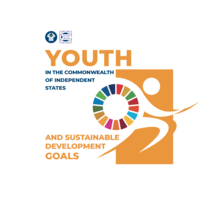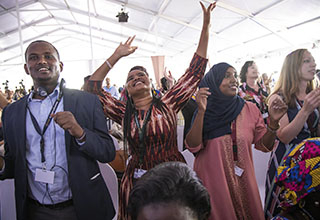The United Nations System in the region of Europe and Central Asia has been working in an integrated manner to support Member States in sustaining the gains and achievements of the Millennium Development Goals and in addressing political, economic, social and environmental challenges. In anticipation of the 2030 Agenda for Sustainable Development, the regional UN system in Europe and Central Asia developed a joint Regional Advocacy Paper “Building More Inclusive, Sustainable and Prosperous Societies in Europe and Central Asia: A common UN vision for the Post-2015 Development Agenda”. It presented an analysis of the key inter-linked development issues commonly faced by the countries in the region, underpinning the work of the regional UN system.
Since the 2030 Agenda was adopted, the regional UN system moved ahead on many fronts to advocate for accelerated approaches to SDG implementation. To take the analysis of and responses to current development challenges further, the Regional Advocacy Paper has been updated and expanded. It now presents cutting-edge approaches to targeted and coherent policies and actions in 14 diverse but inter-linked areas, namely population dynamics, migration and resilience, gender equality, jobs, social protection, health and well-being, education, production an consumption patterns, energy, agriculture and rural development, ecosystems, governance and partnerships. The Regional Advocacy Paper “Building More Inclusive, Sustainable and Prosperous Societies in Europe and Central Asia: From vision to achievement of the Sustainable Development Goals – call for action from the regional UN system” provides key policy recommendations that can help countries overcome the existing development bottlenecks and boost the implementation of the 2030 Agenda, leaving no one behind.
This Regional Advocacy Paper, which was developed by the Regional UN System for Europe and Central Asia with contributions from UNFPA’s Regional Office for Eastern Europe and Central Asia, is the first attempt to look at the whole region in all of its diversity. This diversity offers an untapped opportunity for the region to move towards more sustainable, inclusive and prosperous societies.




